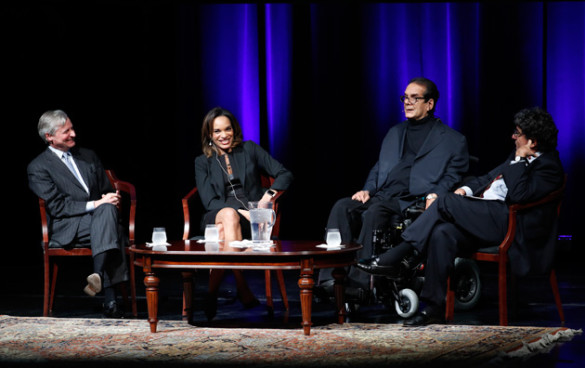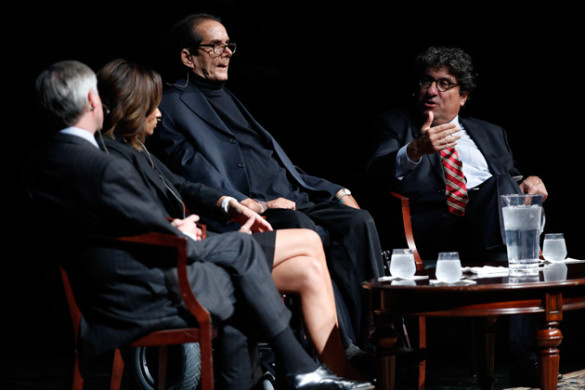
One week after Donald Trump’s surprising victory in the 2016 presidential election, the Vanderbilt campus—and the nation—is still grappling with the outcome. Chancellor Nicholas S. Zeppos hosted two prominent members of the national media as well as Distinguished Visiting Professor Jon Meacham Tuesday evening to discuss the 2016 race and their expectations for a Trump presidency.
“We on our campus are big believers of free speech, of exploring all the different sides of a question. [rquote]Our community has really been thirsting for explanation, analysis and discussion,”[/rquote] Zeppos told CNN Senior Political Reporter Nia-Malika Henderson and syndicated columnist and Fox News contributor Charles Krauthammer before a packed audience in Langford Auditorium Nov. 15. “I really want to thank you on behalf of this crowd, but also the whole Vanderbilt community, for grounding us in your analysis, thoughts and reflections following the election.”
Henderson said a great deal of soul-searching was taking place in media circles and in Washington, D.C., too.
“The day after this happened, a lot of us went on air and said, ‘We were wrong,’” Henderson recalled. “The polls were wrong. The data sources were wrong. Everyone went into that day, including Donald Trump and all of the folks around him, thinking that Hillary Clinton was going to win by four or six points. I think Washington is in shock in a lot of ways—the political establishment, the press, Republicans as well. I think there’s a lot of soul-searching that’s still going to happen going forward.”
Krauthammer said there’s no big mystery behind the polling errors.
“When you do a poll, you don’t use the raw numbers—you run it through a sieve,” he explained. “If you used the 2012 model, or the 2008, you got a model that was heavily ‘Obama-fied,’ meaning he was able to create his own constituency. The question has always been for Democrats whether … that constituency was replicable, because if it was, that meant the Democrats would hold the presidency for a generation. But it turned out that it wasn’t a transitive majority.”
Voter turnout in 2008 and in 2012 was unusually high for so-called “emerging minorities,” and Clinton simply couldn’t entice these groups to come out to vote by the same margins in 2016. “That’s what I think was most striking,” Krauthammer said.
“Let me just add to one thing you said about soul-searching, about the predictions,” he continued. “The Trump people did not expect to win either. … Generally speaking, the reason that the Trump attempt, and now the transition, is so slow and chaotic is because they went through the motions. They didn’t think that there was going to be a transition.”
Ultimately, race did not play as significant a role as class did in the 2016 election, the speakers said.
“If you look at Obama … he was essentially the post-race president,” said Henderson, who focuses on identity politics for CNN. “He didn’t start to talk about systematic racism until maybe 2013, 2014, around the Black Lives Matter movement. If you’re Hillary Clinton, you essentially have to meet Barack Obama where he is in terms of talking about race. Not only do you have to meet him, you have to overcompensate for where he was.
“I think that turned a lot of people off. A lot of African Americans thought she was trying too hard, she was pandering,” Henderson continued. “And a lot of white Americans weren’t too comfortable with feeling bad about race—being reminded about systematic racism or thinking about Black Lives Matter.”
Krauthammer agreed. “I think it’s a mistake if liberals or Democrats tell themselves they lost because of the ‘basket of deplorables,’ or because of racists. If they do, they are going to lose election after election. If anything, this was far more about class than race. And that’s what Trump understood,” he said.

Trump positioned himself as a champion of the overlooked and underserved, Krauthammer said, “the working-class folks who have been penalized by globalization,” to paraphrase Trump.
“I think his diagnosis is slightly wrong,” Krauthammer said. “Globalization is one of the factors, but far more important, as every economist will tell you, is technology and automation. Eighty-five percent of the jobs lost in manufacturing are because of technology. You lose your job to a chip, not to a Chinese worker or someone on the other side of the world.
“So I think he did exploit xenophobia,” Krauthammer said. “He ran a campaign that was disreputable because he blamed it all on foreigners—nothing about aging infrastructure; nothing about institutions of the New Deal that have outlived their usefulness; nothing about what we are doing to meet the challenges of new technologies, expensive technologies, and high health care costs.”
How will President-elect Trump, who has no military or public service experience, govern? Meacham jokingly likened the prospect to “The Godfather meets Lifestyles of the Rich and Famous.”
“In some ways, this is White House Apprentice,” Meacham said. “I’m not being facile. You have to consider, what is the life experience one brings to the job? … Why wouldn’t he be some sort of odd hybrid of real estate magnate and reality show star, given that is how he’s spent his life?”
Henderson agreed. “I think his image of what the presidency is has been shaped by television—the idea that the job of president is this public figure who speaks from behind a desk. I don’t think he knows how sedentary the job often is,” she said.
“And they’re trying to figure out if, when he’s president, can he still do rallies? Because he really likes to do rallies. Even though ‘rallies’ isn’t really the job of being president,” she noted.
Krauthammer said all speculation of Trump’s ability to govern will be put to rest in the coming presidential term.
“It won’t matter whether he does rallies or not. It won’t matter who his appointments are. The Trump presidency will hinge and be judged on whether he delivers,” Krauthammer said. “He will be judged on whether he brings back jobs, number one … or if he satisfies at least some of the promises he’s made to the white, as well as to the non-white, working class. If he doesn’t, he’s finished. And there will be no Trumpism beyond Trump.
“I don’t care how he does it, but we’re going to be able to judge in several years whether or not he delivers,” Krauthammer said. “And if he doesn’t, he will be rejected as thoroughly as Obama was rejected last week.”
Following the event, Zeppos shared additional commentary with MyVU regarding comments and feedback he’s received following the election. Many, regardless of whom they supported for president, have expressed frustration to him and through protests about the reaction and responses from those who do not share their views.
“What I believe many are finding so deeply disturbing about this election, again regardless of whom they voted for, is the chasm they feel has opened between them and their fellow Americans,” Zeppos said. “I have heard time and again since Nov. 8 that people feel they ‘just don’t understand their country.’ This has been an incredibly tumultuous time, and given the continued concerns and division that we are seeing, that tumult may continue for some time.
“[lquote]It is now more important than ever that we reaffirm our commitment to our bedrock principles of free speech and nondiscrimination. Our commitment to these values is most challenging, and also most urgent, when they seem to conflict with one another,”[/lquote] he said. “Our cherished community is and must always be a safe harbor where we can passionately engage in civil and respectful discourse, not with the goal of homogeneous agreement, but with that of understanding.”
The work to promote equity, diversity and inclusion at every level of the university will continue to be his top priority, Zeppos said.
“We remain steadfastly committed to ensuring that the Vanderbilt University campus is a safe, respectful and tolerant community for all. As we have affirmed in words and deeds again and again over the years, all races, religions, ethnicities, sexual orientations, political viewpoints and other differences that make us individuals are celebrated at Vanderbilt,” he said. “As a university, we must continue to engage in the difficult yet imperative conversations we have been having over the last year to overcome prejudice and bias in pursuit of being a model community where every member is valued.”